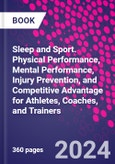The relationship between sleep and both mental and physical performance in athletes has become a key issue over the past several years. Sleep and Sport: Physical Performance, Mental Performance, Injury Prevention, and Competitive Advantage for Athletes, Coaches, and Trainers aims to synthesize the growing scientific evidence in this area to help researchers, clinicians, and others interested in sport to understand the fundamentals of sleep health and how these factors relate to athletes. Serving as an important bridge between the sleep and athletics field, this book educates sleep professionals about how their field of expertise relates to various aspects of athletics, while educating sports professionals about the basics of sleep and how it relates to their field of expertise. This is accomplished by explaining some of the basics of sleep health; reviewing the literature on sleep disorders, treatments, and risk factors for athletes; discussing ways that sleep health impacts physical and mental performance; and addressing key specific areas where these fields overlap. In all cases, this text will draw from the existing peer-reviewed literature, in order to provide evidence-based guidance that is objective and well explained.
Please Note: This is an On Demand product, delivery may take up to 11 working days after payment has been received.
Table of Contents
1. Basics of Sleep-Wake Physiology for Athletes and Sport Professionals2. Basics of Circadian Rhythms for Athletes and Sport Professionals
3. Basics of Sleep Problems and Sleep Disorders for Athletes and Sport Professionals
4. Sleep Problems in Athletes: Prevalence, and Causes
5. Assessment of Sleep in Athletes
6. Screening for Sleep Disorders in Athletes
7. Sleep and Physical Performance in Athletes
8. Sleep and Cognitive Performance in Athletes
9. Sleep and Mental Health in Athletes
10. Sleep and Recovery in Athletes
11. Sleep and Injury Prevention in Athletes
12. Circadian Advantage
13. Strategic Napping
14. Sleep, Nutrition, and Supplements
15. Managing Travel and Jet Lag
16. Wearables and Sleep Tracking in Athletics Programs
17. Developing a Sleep and Circadian Health Program
18. Resources and Further Reading








